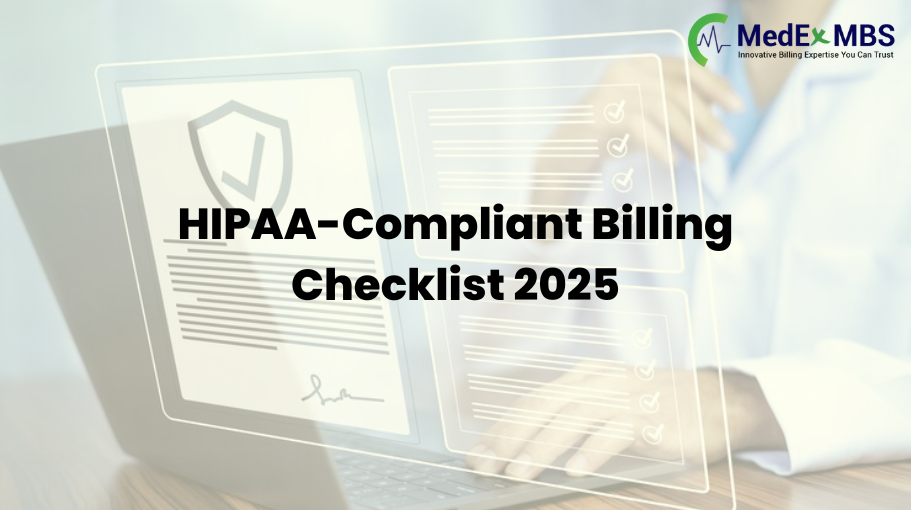HIPAA-Compliant Billing Checklist 2025

The complexity of HIPAA-compliant billing has increased significantly. In 2024, healthcare data breaches affected over 133 million records, and enforcement fines consistently exceeded $1 million for each violation. Healthcare organizations are encountering serious risks in this environment. The situation became even more complicated in 2025 when the Department of Health and Human Services (HHS) introduced the first significant update to the Security Rule since 2013. This update includes mandatory multi-factor authentication, encryption requirements, and much stricter oversight of vendors. For those managing a billing department, this means navigating evolving regulations while ensuring smooth operations and the protection of patient data. Regardless of whether you operate a small practice or a large healthcare provider, understanding these changes is crucial to avoid costly penalties and maintain patient trust. How Does HIPAA Influence Medical Billing? Let us begin with the fundamentals. It is essential to understand who is affected by HIPAA and how billing is integrated into these regulatory requirements. Who Must Comply with These Regulations Covered Entities: This includes healthcare providers, health plans, and clearinghouses that manage electronic health transactions. Business Associates: These are vendors and consultants who handle protected health information (PHI). The Three Primary Rules That Affect Billing Privacy Rule: Governs the usage, sharing, and disclosure of patient billing information. Breach Notification Rule: Outlines the procedures for reporting data breaches related to billing records and specifies the timing for such notifications. These regulations work in concert to ensure the security of patient data throughout the entire HIPAA-compliant billing process, from claim submission to payment processing. New HIPAA Compliance Obligations for 2025 The regulatory landscape has undergone significant changes this year. Significant Modifications to Security Regulations (January 2025) Mandatory Multi-Factor Authentication: Now a requirement for accessing the billing system Required Encryption: Both stored and in-transit data must be safeguarded Annual Penetration Testing: Yearly security assessments and biannual vulnerability scans are necessary 24-Hour Vendor Notifications: Business partners must inform you within a day if an issue arises Stricter Enforcement OCR investigations increased by 264% following the ransomware incidents of 2024 More severe penalties if patients experience delays in obtaining their billing records New 6-year mandate for retaining all compliance documentation These modifications have shifted the guidance from “you should probably do this” to “you absolutely must do this.” Proactively addressing these changes is essential to avoid penalties. 10-Point HIPAA-Compliant Billing Checklist for 2025 Conduct a Comprehensive Risk Assessment and Map Your Systems Begin with an exhaustive Security Risk Analysis that specifically targets your HIPAA-compliant billing systems. Document every piece of technology that interacts with electronic protected health information (ePHI) – including practice management systems, clearinghouses, vendor platforms, and more. Create a detailed map illustrating the flow of patient information throughout your billing process, from initial registration to the receipt of the final payment. It is advisable to update this map annually or whenever you introduce new billing software, alter your procedures, or engage new vendors. Your documentation should address the likelihood of various threats, the vulnerabilities identified, and the specific strategies you employed to mitigate each risk. Establish Multi-Factor Authentication (No Exceptions) The upcoming changes to the 2025 Security Rule make it abundantly clear: multi-factor authentication is no longer optional. Anyone accessing billing systems containing ePHI is required to implement it. Deploy it throughout the HIPAA-compliant billing infrastructure: Practice management systems Electronic health record platforms Clearinghouse portals Vendor billing applications Email systems that manage PHI Ensure that individuals are required to verify their identity through at least two methods (password plus phone or app verification). Your MFA system must integrate seamlessly with the existing workflows of your billing team – security measures should not hinder productivity. Encrypt All Data All ePHI within HIPAA-compliant billing must be encrypted, whether it resides on your servers or is transmitted between systems. This includes data stored on servers, laptops, mobile devices, and backup systems, as well as any information exchanged between systems, vendors, and clearinghouses. Verify that your billing software, practice management system, and third-party applications utilize robust encryption (AES-256 at a minimum). The 2025 regulations mandate encryption as a necessity, rather than a luxury. Regulate Access to Information (And Terminate It Promptly) Implement stringent controls so that your HIPAA-compliant billing team can only access the PHI necessary for their specific roles. Establish various user categories such as: Claims processors (limited to claim preparation and submission) Payment posters (focused on payment and adjustment tasks) Billing managers (granted full access along with audit capabilities) Crucially, you must have procedures in place to revoke access within one hour when an employee departs or changes positions. This swift termination of access is a significant aspect of the proposed 2025 updates and prevents unauthorized individuals from accessing sensitive billing information. Develop Your Emergency Response Strategy and Vendor Notification System Formulate a strategy specifically addressing HIPAA-compliant billing security issues, system breaches, ransomware incidents, and unauthorized access to PHI. Your strategy must delineate clear responsibilities, notification timelines, and recovery procedures. Revise every Business Associate Agreement to ensure that vendors are obligated to inform you within 24 hours if they activate their emergency protocols. Organize Your Security Assessments The proposed 2025 Security Rule mandates regular assessments that extend beyond basic risk evaluations. Ensure that a thorough penetration test of your HIPAA-compliant billing systems is conducted annually by certified security professionals. Additionally, perform vulnerability scans biannually to identify potential weaknesses within your network. Document all findings and the corrective actions taken. These records demonstrate your proactive management of security when regulators conduct inquiries. Monitor Everything and Conduct Regular Reviews Enable comprehensive logging across all HIPAA-compliant billing systems to monitor who accesses PHI, the timing of such access, and the actions taken. Your logs should include: Attempts to log in and access patterns Modifications to PHI and adjustments to claims Changes to system settings Unsuccessful access attempts and security notifications Review these logs monthly for any irregularities and perform formal compliance evaluations at least once a year. These assessments ought
